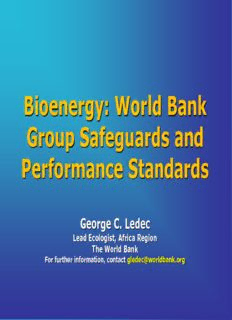
World Bank Group Safeguards and Performance Standards PDF
Preview World Bank Group Safeguards and Performance Standards
Bioenergy: World Bank Group Safeguards and Performance Standards George C. Ledec Lead Ecologist, Africa Region The World Bank For further information, contact [email protected] World Bank Safeguard Policies: An Overview Safeguard Policies are Board- approved rules for addressing environmental and social issues within Bank-supported development projects. Effective implementation of Safeguard Policies provides a “License to Operate” in a world concerned with sustainable development. 2 World Bank Group Safeguard Policies and Performance Standards • IBRD/IDA – Government lending – 10 Environmental, social and legal Safeguard Policies • IFC – Private-sector lending • MIGA – Guarantees Performance Standards • One or both systems may apply to a bioenergy project The 10+ Safeguard Policies OP/BP 4.01: OP/BP 4.12: Environmental Involuntary Resettlement Assessment OP 4.10: Indigenous Peoples OP/BP 4.04: Natural Habitats OP/BP 4.37: OP/BP 4.36: Forests Safety of Dams OP 4.09: OP/BP 7.50: Projects on Pest Management International Waterways OP/BP 4.11: Physical OP/BP 7.60: Projects in Cultural Resources Disputed Areas Plus: Access to Plus OP 4.00: Piloting the Use of Information Policy Borrower Systems 4 Environmental and Social Impacts of Bioenergy Projects are linked to: • Obtaining the Feedstock (Biomass) – Agriculture (irrigated or rain-fed crops) – Forestry (natural or plantations) – Solid waste (agricultural residues, landfills, etc.) • Converting the Biomass to Energy – Liquid wastes (water pollution) – Combustion (air pollution) • Transporting the Feedstock or Energy – Road or rail transport; pipelines – Power transmission lines – Ports 5 Potential Environmental and Social Impacts of Bioenergy Projects • Direct and induced impacts – Deforestation and intensified land use – Water use and pollution (effluents, agrochemicals, sedimentation) – Biodiversity loss – Invasive species – Displacement of food crops – Displacement of vulnerable populations – Community and worker health and safety – GHG impacts: Positive or negative? Environmental Assessment OP 4.01 OP 4.01 is the Umbrella Safeguards Policy which specifies the environmental assessment process used to ensure compliance with the other Safeguard Policies. Category A projects require full EIA (ESIA) with EMP (ESMP). Category B projects require some type of environmental analysis report (more flexible). Category C projects require no environmental analysis (beyond initial screening). Category FI projects require assessment/strengthening of capacity of financial intermediaries that fund sub-projects Screening: Category A Category A: “significant, adverse environmental impacts that are ‘sensitive,’ diverse or unprecedented” - “Sensitive” impact: May be irreversible or raise significant issues reflected in various safeguard policies relating to natural habitats (e.g., lead to loss of major natural habitat), involuntary resettlement, impacts on indigenous peoples or physical cultural resources - May affect an area broader than sites or facilities subject to physical works Category A: Possible Bioenergy Examples Large-scale agriculture, irrigation/drainage, tree plantations Large industrial facilities, especially with significant pollution Large-scale infrastructure (roads, railways, ports) Any greenfield project where there is likely to be significant displacement of people or their livelihoods Screening: Category B Category B: “potential adverse environmental impacts…are less adverse than category A; site- specific, few if any irreversible, mitigatory measures designed more easily than for Category A” - Scope of EA narrower than for Category B - Different instruments could be used, not necessarily a full, detailed ESIA
Description: